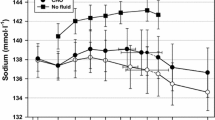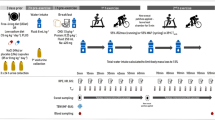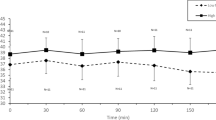Abstract
Negative potassium balance during hypokinesia (decreased number of kilometers taken/day) is not based on the potassium shortage in the diet, but on the impossibility of the body to retain potassium. To assess this hypothesis, we study the effect of potassium loading on athletes during prolonged hypokinesia (HK).
Studies were done during 30 d of a pre-HK period and during 364 d of an HK period. Forty male athletes aged 23–26 yr were chosen as subjects. They were divided equally into four groups: unloaded ambulatory control subjects (UACS), unloaded hypokinetic subjects (UHKS), loaded hypokinetic subjects (LHKS), and loaded ambulatory control subjects (LACS). For the simulation of the hypokinetic effect, the LHKS and UHKS groups were kept under an average running distance of 1.7 km/d. In the LACS and LHKS groups, potassium loading tests were done by administering 95.35 mg KC1 per kg body weight.
During the pre-HK and HK periods and after KC1 loading tests, fecal and urinary potassium excretion, sodium and chloride excretion, plasma potassium, sodium and chloride concentration, and potassium balance were measured. Plasma renin activity (PRA) and plasma aldosterone concentration was also measured. Negative potassium balance increased significantly (p < -0.01) in the UHKS and LHKS groups when compared with the UACS and LACS groups. Plasma electrolyte concentration, urinary electrolyte excretion, fecal potassium excretion, PRA, and PA concentration increased significantly (p ≤ 0.01) in the LHKS and UHKS groups when compared with LACS and UACS groups. Urinary and fecal potassium excretion increased much more and much faster in the LHKS group than in the UHKS group. By contrast, the corresponding parameters change insignificantly in the UACS and LACS groups when compared with the base line control values.
It was concluded that urinary and fecal potassium excretion increased significantly despite the presence of negative potassium balance; thus, negative potassium balance may not be based on potassium shortage in the diet because of the impossibility of the body to retain potassium during HK.
Similar content being viewed by others
References
V. P. Krotov, Kinetics and regulation of fluid-electrolyte metabolism in animals and human beings during hypokinesia, PhD thesis, “Interkosmos” Council Academy of Sciences USSR and Directorate of Kosmic Biology and Meditsine, Ministry of Health USSR, Moscow, Russia (1978).
L. I. Kakurin, G. S. Arzamazov, and A. I. Grigoŕyev, Kaliuretic renal function in man as related to different degrees of exercise during bed rest,Kosmic Biol. 12, 13–17 (1978).
Y. G. Zorbas, N. I. Abratov, and C. B. Stoikolescu, Renal excretion of potassium in men under hypokinesia and physical exercise with chronic hyperhydration,Urologia 53, 229–238 (1988).
Y. G. Zorbas, K. A. Naexu, and Y. F. Federenko, Effect of potassium and calcium loading on healthy subjects under hypokinesia and physical exercise with fluid and salt supplements,Acta Astronautica 36, 183–189 (1995).
Y. G. Zorbas, K. A. Naexu, and Y. F. Federenko, Potassium changes in trained subjects after potassium loading and during restriction of muscular activity and chronic hyperhydration,Biol. Trace Element Research 53, 233–245 (1996).
A. V. Chernyy, Effect of hypodynamia on animals reactions to administration of glucose, epinephrine and insulin referable to some parameters of carbohydrate metabolism, PhD thesis, “Interkosmos” Council Academy of Sciences and Directorate of Kosmic Biology and Meditsine, Ministry of Health USSR, Moscow, Russia (1974).
B. D. Rosse,Clinical Physiology of Acid-Base and Electrolyte Disorders, 2nd ed. McGraw-Hill, New York, 1984.
A. I. Grigoŕyev, G. S. Arzamazov, and B. R. Dorokhova,Methodological Recommendations on Use of Water-Salt Loading Tests to Assess Renal Function in Man, Meditsina, Moscow, Russia, 1979.
J. H. Lohman, A. F. Roche, and R. Martorell (eds.),Anthropometric Standardization Reference Manual, Human Kinetics, Champaign, IL, 1988.
J. Brozek, F. Grande, J. T. Anderson, and A. Keys, Densitometric analysis of body composition,Annals of the New York Academy of Sciences,110, 113–140 (1963).
I. V. Fedorov and L. A. Grishanina, Nitrogen metabolism in animals exposure to hypodynamia,Kosmicheskaya Biol. 1, 43–48 (1967).
I. V. Fedorov, A. V. Chernyy, and A. I. Fedorov, Synthesis and catabolism of tissue proteins during hypodynamia and resumption of muscular activity,Fiziol. Zh. SSSR 63, 1128–1133 (1977).
Y. G. Zorbas, G. E. Verentsov, and Y. F. Federenko, Renal excretion of end products of protein metabolism in urine of endurance trained subjects during restriction of muscular activity,Panminerva Med. 37, 109–114 (1995).
T. M. Lobova, Blood and tissue lipids in hypodynamic rats,Kosmicheskaya Biol. 7, 32–35 (1973).
Yu. P. Ryĺnikov, Hypokinetic effect on the lipid composition of blood and tissues of rabbits of different age,Kosmicheskaya Biol. 8, 8–13 (1974).
Y. G. Zorbas and V. M. Petrovskiy, Carbohydrate and lipid metabolism of the heart and liver in rabbits under hypokinetic stress, inPathogenesis of Stress-Induced Heart Disease, R. E. Beamish, V. Panagia, and N. S. Dhalla (eds.), Martinus Nijhoff Publishing, The Netherlands, 1984, pp. 397–404.
V. A. Tishler, V. M. Zatsiorskiy and V. N. Seluyanov, Study of mass-inertia characteristics of human body segments during six month hypokinesia by gamma scanning method,Kosmicheskaya Biol. 15, 36–42 (1981).
Y. G. Zorbas, V. R. Bobylev, and A. N. Naexu, Physical exercise in preserving men’s body mass under hypokinesia,Inter. J. Rehab. Research 12, 326–330 (1989).
Y. G. Zorbas, V,. R. Bobylev, A. N. Marketi, and Y. F. Federenko, Body mass changes in endurance trained volunteers during prolonged restriction of muscular activity and chronic hyperhydration,Sports Med. Training and Rehab. 4, 167–176 (1993).
Ye. V. Gushevas and R. Yu. Tashpulatov, Effect of flights of differing duration on protein composition of cosmonauts’ blood,Kosmicheskaya Biol. 14, 13–17 (1980).
Y. G. Zorbas, Y. Y. Yaroshenko, O. L. Georgeascu and M. N. Tanaka, Haemoglobin mass in men after hypokinesia and physical exercise with chronic hyperhydration,Modelling Simulation Control 21, 43–56 (1990).
Y. G. Zorbas, A. L. Ivanov, and Y. K. Imura, Changes in total body potassium haemoglobin and bromine space after hypokinesia and physical exercise,Materia Medica Polona 22, 300–303 (1990).
V. T. Bakhteyeva, Distinctions of potassium excretion by the kidneys of vertebrates, and cellular mechanisms of secretion of potassium, PhD thesis, “Interkosmos” Council, Academy of Sciences USSR and Directorate of Kosmic Biology and Meditsine, Ministry of Health USSR, Moscow, Russia, 1975.
Yu. V. Natochin, Regulation of potassium by the kidneys of animals,Fiziol. Zh. SSSR 48, 1278–1286 (1974).
Author information
Authors and Affiliations
Rights and permissions
About this article
Cite this article
Zorbas, Y.G., Kakurin, V.J., Afonin, V.B. et al. Potassium loading effect on potassium balance in athletes during prolonged restriction of muscular activity. Biol Trace Elem Res 70, 1–19 (1999). https://doi.org/10.1007/BF02783845
Received:
Accepted:
Issue Date:
DOI: https://doi.org/10.1007/BF02783845




